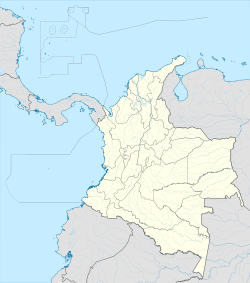Zipacón
| Zipacón | |||
|---|---|---|---|
| Municipality and town | |||

Central square and church
|
|||
|
|||
 Location of the municipality and town of Zipacón inside Cundinamarca Department of Colombia |
|||
| Location in Colombia | |||
| Coordinates: 4°45′36″N 74°22′47″W / 4.76000°N 74.37972°WCoordinates: 4°45′36″N 74°22′47″W / 4.76000°N 74.37972°W | |||
| Country |
|
||
| Department |
|
||
| Province | Western Savanna Province | ||
| Founded | 5 July 1561 | ||
| Founded by | José Antonio Rubio | ||
| Government | |||
| • Mayor | Gustavo Cortés Camacho (2016-2019) |
||
| Area | |||
| • Municipality and town | 70 km2 (30 sq mi) | ||
| Elevation | 2,550 m (8,370 ft) | ||
| Population (2016) | |||
| • Municipality and town | 5,570 | ||
| • Density | 80/km2 (210/sq mi) | ||
| • Urban | 2,081 | ||
| Time zone | Colombia Standard Time (UTC-5) | ||
| Website | Official website | ||
Zipacón (Spanish pronunciation: [sipaˈkon]) is a municipality and town of Colombia in the Western Savanna Province, part of the department of Cundinamarca. The urban centre of Zipacón is situated at an altitude of 2,550 metres (8,370 ft) on the Bogotá savanna, the southern flatlands of the Altiplano Cundiboyacense in the Eastern Ranges of the Colombian Andes. Zipacón borders Anolaima, Facatativá, La Mesa and Bojacá.
The name Zipacón comes from Muysccubun and means "crying of the zipa".
In the times before the Spanish conquest, Zipacón was inhabited by the Muisca, organised in their loose Muisca Confederation. Zipacón was the site of meditation for the zipa. The settlement was at the border with the Panche, eternal enemies of the Muisca. It was in Zipacón where the Panche invaded when the Spanish conquistadors were conquering the Bogotá savanna.
The oldest evidences for agriculture of potatoes on the Bogotá savanna has been unearthed in Zipacón and dated at 3200 years BP. The setlement was inhabited since the Herrera Period, at least since 3270 BP.Rock art has been discovered in Zipacón.
...
Wikipedia



